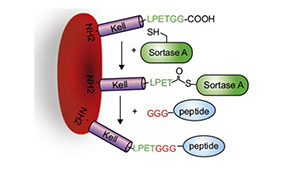 Researchers from the Whitehead Institute for Biomedical Research modified red blood cells with disease-specific antigens to prevent and alleviate multiple sclerosis and Type I diabetes in early stage mouse models. The team’s work was published this week in PNAS.
Researchers from the Whitehead Institute for Biomedical Research modified red blood cells with disease-specific antigens to prevent and alleviate multiple sclerosis and Type I diabetes in early stage mouse models. The team’s work was published this week in PNAS.
Conventional therapies for autoimmune diseases include immunosuppressants, but these drugs can desensitize the immune system’s response to pathogens. Instead, the team of researchers employed red blood cells tagged with antibodies to train the immune system to ignore antigens that cause the body to attack itself.
“This is a very promising step in the development of therapies for autoimmune diseases,” lead researcher Harvey Lodish said in prepared remarks. “If this type of response is also true in humans, then it could make a lot of these therapies possible for these diseases and similar conditions.”
Red blood cells can quickly access tissue and they are recycled every month in mice and every 4 months in humans.
In this experiment, the team drew blood from a mouse and tagged red blood cells with the antigens that trigger the harmful immune response. They then transfused the manipulated red blood cells back into mouse models of T1D and MS – the entire process takes 1 hour, the researchers reported.
The transfusions reduced the disease’s symptoms and a single injection prior to the onset of disease prevented further symptoms, according to the team.
“Essentially what we’re doing is hijacking the red blood cell clearance pathway, such that the foreign antigen masquerades as the red blood cells’ own, such that these antigens are being tolerated in the process,” 1st author Novalia Pishesha explained.

